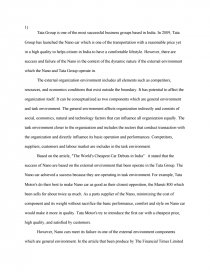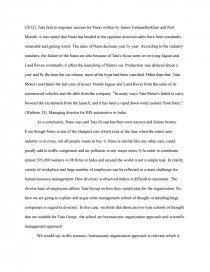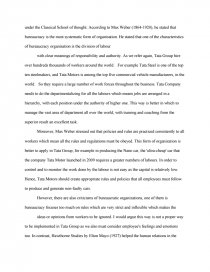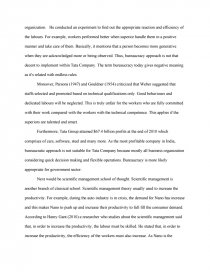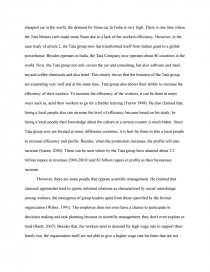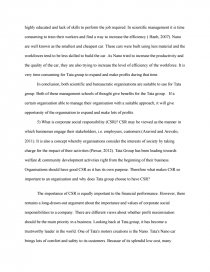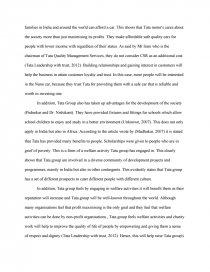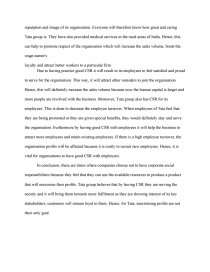Tata Group Case
Essay by mxue12 • May 15, 2013 • Case Study • 2,847 Words (12 Pages) • 1,545 Views
1)
Tata Group is one of the most successful business groups based in India. In 2009, Tata Group has launched the Nano car which is one of the transportation with a reasonable price yet in a high quality to helps citizen in India to have a comfortable lifestyle. However, there are success and failure of the Nano in the context of the dynamic nature if the external environment which the Nano and Tata Group operate in.
The external organization environment includes all elements such as competitors, resources, and economics conditions that exist outside the boundary. It has potential to affect the organization itself. It can be conceptualized as two components which are general environment and task environment. The general environment affects organization indirectly and consists of social, economics, natural and technology factors that can influence all organization equally. The task environment closer to the organization and includes the sectors that conduct transaction with the organization and directly influence its basic operation and performances. Competitors, suppliers, customers and labour market are includes in the task environment.
Based on the article, "The World's Cheapest Car Debuts in India" it stated that the success of Nano are based on the external environment that been operate in the Tata Group. The Nano car achieved a success because they are operating in task environment. For example, Tata Motor's do their best to make Nano car as good as their closest opposition, the Maruti 800 which been sells for about twice as much. As a parts supplier of the Nano, minimizing the cost of component and its weight without sacrifice the basic performance, comfort and style on Nano car would make it more in quality. Tata Motor's try to introduce the first car with a cheapest price, high quality, and satisfied by customers.
However, Nano cars meet its failure in one of the external environment components which are general environment. In the article that been produce by The Financial Times Limited (2012), Tata fails to engineer success for Nano written by James Fontanella-Khan and Neil Munshi, it was stated that Nano has headed in the opposite direction sales have been constantly miserable and getting worst. The sales of Nano decrease year by year. According to the industry watchers, the failure of the Nano are also because of Tata's focus went on reviving Jaguar and Land Rover, eventually it affect the launching of Nano's car. Production was delayed about a year and by the time the car release, most of the hype had been vanished. Other than that, Tata Motor's purchases the last year of luxury brands Jaguar and Land Rover from the sales of its commercial vehicles and the debt from the company. "In many ways Tata Motor's failed to carry forward the excitement from the launch, and it has been a rapid down word journey from there," ( Rathore, D), Managing director for IHS automotive in India.
As a conclusion, Nano cars and Tata Group has their own success and failure history. Even though Nano is one of the cheapest cars which exist at the time when the entire auto industry is in crisis, not all people wants to buy it. Nano is similar like any other cars, could greatly add to traffic congestion and air pollution in any major cities.3) In order to coordinate almost 395,000 workers in 98 firms in India and around the world is not a simple task. In reality, variety of workplace and large number of employees can be reflected as a main challenge for human resource management. How diversity is observed makes it difficult to encounter. The diverse base of employees affects Tata Group on how they would plan for the organization. So, here we are going to explain and argue what management school of thought in handling large companies in regard to diversity. In this case, we think that there are two type schools of thought that are suitable for Tata Group , the school are bureaucratic organization approach and scientific management approach.
We would say in this scenario, bureaucratic organization approach is relevant which is under the Classical School of thought. According to Max Weber (1864-1920), he stated that bureaucracy is the most systematic form of organisation. He stated that one of the characteristics of bureaucracy organisation is the division of labour
with clear meanings of responsibility and authority. As we refer again, Tata Group hire over hundreds thousands of workers around the world. For example Tata Steel is one of the top ten steelmakers, and Tata Motors is among the top five commercial vehicle manufacturers, in the world. So they require a large number of work forces throughout the business. Tata Company needs to do the departmentalizing for all the labours which means jobs are arranged in a hierarchy, with each position under the authority of higher one. This way is better in which to manage the vast area of department all over the world, with training and coaching from the superior result an excellent task.
Moreover, Max Weber stressed out that policies and rules are practiced consistently to all workers which mean all the rules and regulations must be obeyed. This form of organization is better to apply in Tata Group, for example in producing the Nano car, the 'ultra-cheap' car that the company Tata Motor launched in 2009 requires a greater numbers of labours. In order to control and to monitor the work done by the labour is not easy as the capital is relatively low. Hence, Tata Motors should create appropriate rules and policies that all employees must follow to produce and generate non-faulty cars.
However, there are also criticisms of bureaucratic organizations, one of them is bureaucracy focuses too much on rules which are very strict and inflexible which makes the
ideas or opinions from workers to be ignored. I would argue this way is not a proper way to be implemented in Tata Group as we also must consider employee's feelings and emotions too. In contrast, Hawthorne Studies by Elton Mayo (1927) helped the human relations in the organization. He conducted an experiment to find out the appropriate reaction and efficiency of the labours. For example, workers performed better when superior handle them in a positive manner and take care of them. Basically, it mentions that a person becomes more generative when they are acknowledged more or being observed. Thus, bureaucracy approach is not that decent to implement within Tata Company. The term bureaucracy today gives negative meaning as it's related with endless rules.
Moreover, Parsons (1947) and Gouldner (1954) criticized that Weber suggested that staffs selected and promoted based on technical qualifications only.
...
...
